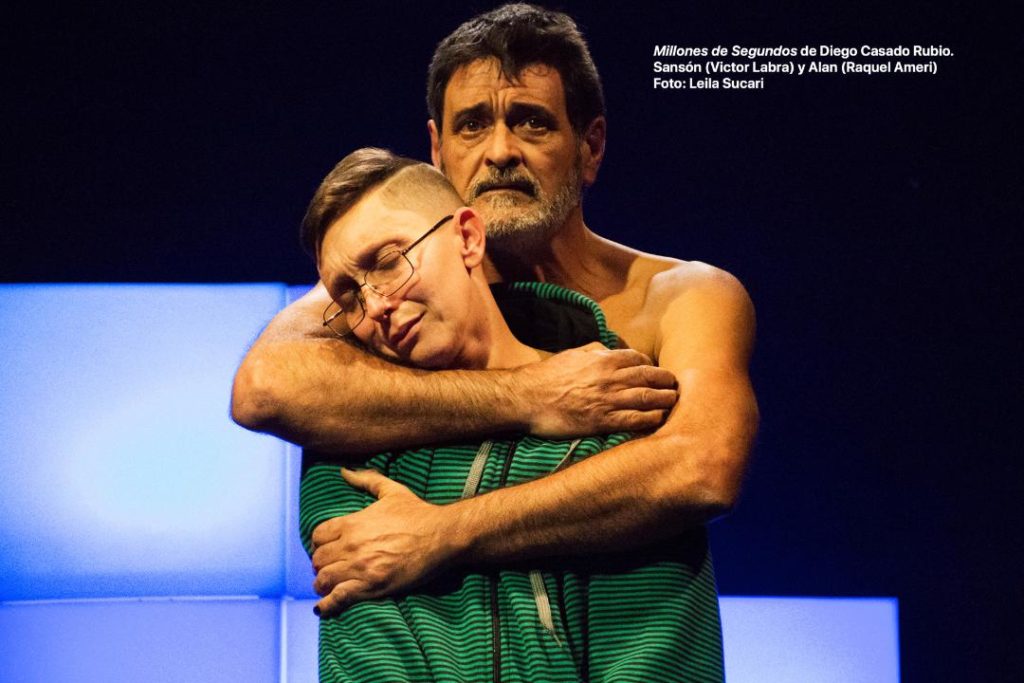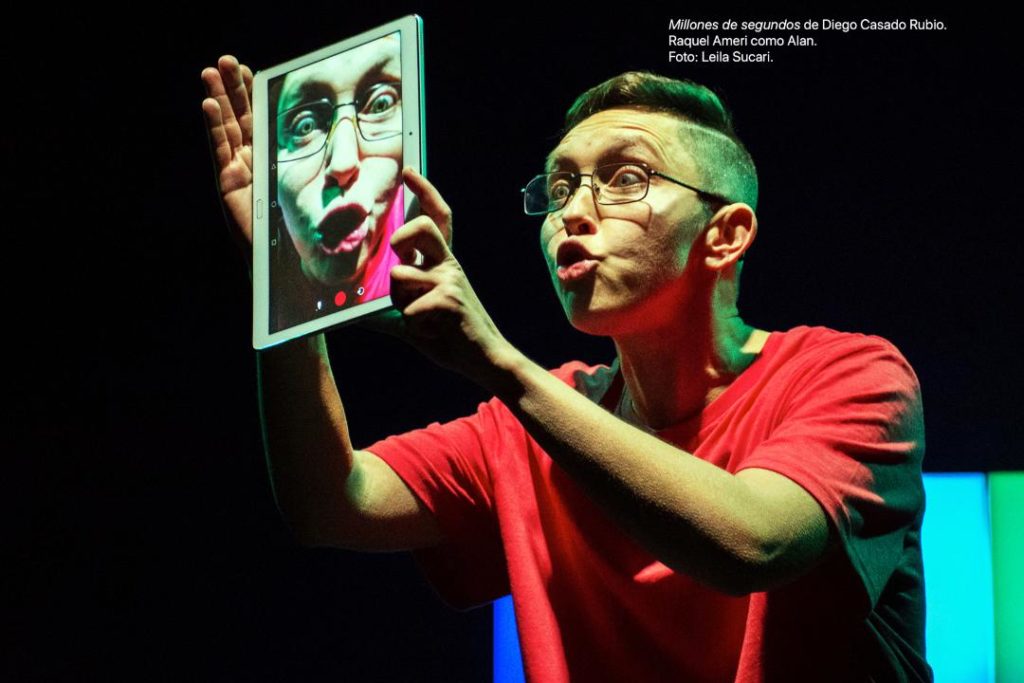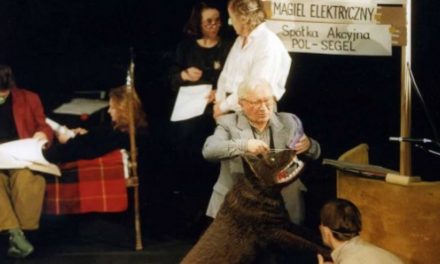The desired body vis a vis tradition, and institutional normative sedimentation.
Millions Of Seconds, written and directed by Diego Casado Rubio, and with the excellent performances of María Rosa Frega (Clarisa, the Mother), Raquel Ameri (Alan) and Víctor Labra (Samson, the dog), was performed at the Teatro el Extranjero de Buenos Aires, during 2017 (38 performances) and will continue in 2018. The play was awarded in the areas of direction, playwriting and spatial design-stage (Casado Rubio), acting (Ameri and Frega), lighting (Verónica Alcoba), costumes (Vessna Bebek), and photography (Juan Borraspardo). Awards for Best Director, Best Actress (Ameri) and Best Photographer. Ameri also won the Audience Award and the Prize for Best Leading Actress.
Casado Rubio explains the origin of the proposal: “At the beginning of 2016 I saw a video on YouTube of a trans boy who had recorded when he was having an Asperger crisis: he was self-beating in the middle of a nervous breakdown and crying (in the video appeared his dog–a trained Rottweiler–trying to avoid Alan’s self-inflicted injuries with his legs. He moved me to tears and at that same moment I decided that there was a story that needed to be told.” (Electronic interview).

Millions Of Seconds by Diego Casado Rubio, Samson (Víctor Labra) and Alan (Raquel Ameri). Photo: Leila Sucari.
The program reads: “When was five years old, Alan knew it was from another planet and began to count the seconds remaining to stop living in that body. Today has 554 million seconds and still retains the hope of starting the transformation and be able to continue to use the men’s bathroom. Alan cannot afford open windows, likes the doors closed, he records videos and uploads them to YouTube; makes a list of everything. Alan is a transsexual teenager with Asperger’s Syndrome.“ This story is the origin of this moving event. Today Alan continues to count the seconds to get out of this body that feels alien, without losing the hope of transformation that is denied, due to the syndrome that he suffers.
In Million Of Seconds, Casado Rubio deals with a very contemporary problem suffered by a very marginal sector of society. He had already done so in La Mujer Cama. In this play, the mother and housewife refuses to do chores as she stays in bed all the time. As in the case of Millions Of Seconds, the gaze on the situation is different and original: what at first sight appears to be an attitude of resistance to playing the traditional women’s role, is actually the only way that the character has in order to deal with domestic abuse. In both examples, the remarkable feature is the original mode of approaching these problems.
Millions Of Seconds raises the isolation, the easy and drastic judgment of the institutions, which unload on Alan hatred and rejection: the school with the persecution, the mockery, and the violence that their classmates deploy against this different being, and the medicine that refuses to surgically intervene to give him the desired body. He also has difficulties in his relationship with his mother who does not accept the situation and insists that she “gave birth to a daughter.” Alan says, “for once I see myself screaming and beating them up. You look at me like that. I want to infect you with anything, what you think I have. I’m disgusted by your contempt. It would be an act of freedom. I want to be the one to yell at you, the one who hits you. But I promised Samson it wasn’t going to be like that, and he promised me a beautiful life by his side.” At the end, Alan refuses to lose hope of getting a body according to the identity about which he has no doubt: Nala is Alan, he is a boy.

Millions Of Seconds by Diego Casado Rubio, María Rosa Frega (the Mother) Photo: Leila Sucari
With an almost empty stage, aided only by the changes of light that illuminate the colored cubes, the only scenographic element of the proposal, Casado Rubio produces the various spaces in which the action takes place. These perfectly formed and limited elements seem to suggest the closed look, framed in the tradition, that society exerts on the different, which is confirmed by the words of Alan when he says: “the problem is not the difference, it is the incomprehension”.
Casado Rubio incorporates technology into the scene in an integral manner since it completes the meaning of the proposal. The “tablet” is Alan’s only link to the world and accounts for the isolation in which the character lives and whose only connection with the outside world occur when he omits the source of social conflict: his corporality. On the other hand, Alan insists on putting together a Rubik cube, just as he tries to build his life, with rebellion and hope, although always limited, like the cube, by the available options. Enriching, even more, the multiplicity of nuances and possible readings, Casado Rubio puts the only gesture of humanity in Samson, the dog, Alan’s faithful companion, magnificently played by Labra.

Millions Of Seconds by Diego Casado Rubio, Raquel Ameri (Alan ) Photo: Leila Sucari
Raquel Ameri in a wonderful performance, embodies Alan putting his body at the disposal of the character (even shaving her long hair). The character lives the scene with naturalness, without any dissimulation that makes the situation more acceptable, managing to adopt an ambiguous corporality that cannot be identified either as feminine or as masculine, and whose age we cannot guess either. Ameri holds a perfect level of concentration throughout the show.
The public remains motionless before this stark scene that, with an accelerated rhythm, carries out the drama to force us to witness the complex problem that confronts its prejudices silenced under the formalism of the laws that in Argentina recognize sexual diversity. The spectators went silent and traversed by what they just lived, moved, and “shacked on their seats” by the “slapping” received, as Casado Rubio aims at. The director and playwright choose, once again, a delicate theme, which divides the Argentine society, treating it on the scene in a very particular way. The proposal leaves open the space for discussion and reflection, thus reaching a broad spectrum of reception with a subject that borders on the politically annoying, and that risks a possible rejection from part of the audience. The scene forces the public to put in question the level of acceptance of what is different.
This post was written by the author in their personal capacity.The opinions expressed in this article are the author’s own and do not reflect the view of The Theatre Times, their staff or collaborators.
This post was written by Lola Proaño Gomez.
The views expressed here belong to the author and do not necessarily reflect our views and opinions.



















